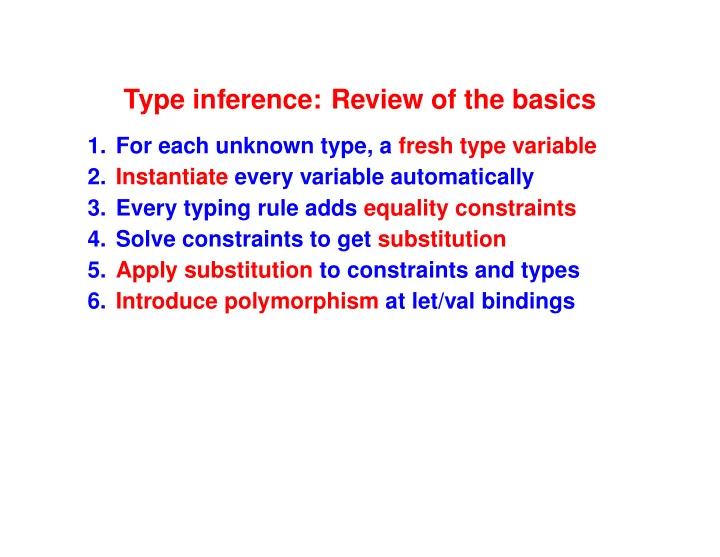

Type inference: Review of the basics 1. For each unknown type, a fresh type variable 2. Instantiate every variable automatically 3. Every typing rule adds equality constraints 4. Solve constraints to get substitution 5. Apply substitution to constraints and types 6. Introduce polymorphism at let/val bindings
Review: Using polymorphic names -> (val cc (lambda (nss) (car (car nss))))
Using polymorphic names -> (val cc (lambda (nss) (car (car nss)))) cc : (forall (’a) ((list (list ’a)) -> ’a))
Your turn! Given empty : (forall [’a] (list ’a)) cons : (forall [’a] (’a (list ’a) -> (list ’a))) For (cons empty empty) You fill in: 1. Fresh instances 2. Constraints 3. Final type
Bonus example -> (val second (lambda (xs) (car (cdr xs)))) second : ... -> (val two (lambda (f) (lambda (x) (f (f x))))) two : ...
Bonus example solved -> (val second (lambda (xs) (car (cdr xs)))) second : (forall (’a) ((list ’a) -> ’a)) -> (val two (lambda (f) (lambda (x) (f (f x))))) two : (forall (’a) ((’a -> ’a) -> (’a -> ’a)))
Making Type Inference Precise Sad news: • Type inference for polymorphism is undecidable Solution: • Each formal parameter has a monomorphic type Consequences: • The argument to a higher-order function cannot be mandated to be polymorphic • forall appears only outermost in types
We infer stratified “Hindley-Milner” types Two layers: Monomorphic types � Polymorphic type schemes � type variables � ::= � type constructors: int , list j � constructor application � n ( � 1 j ; : : : ) � type scheme � n 8 � 1 � ::= ; : : : : � Each variable in � introduced via LET , LETREC , VAL , and VAL - REC has a type scheme � with 8 Each variable in � introduced via LAMBDA has a degenerate type scheme � —a type, wrapped 8 :
Representing Hindley-Milner types type tyvar = name datatype ty = TYVAR of tyvar | TYCON of name | CONAPP of ty * ty list datatype type_scheme = FORALL of tyvar list * ty fun funtype (args, result) = CONAPP (TYCON "function", [CONAPP (TYCON "arguments", args), result])
Key ideas Type environment � binds var to type scheme � • singleton : � list 8 � : � ! • cc : � list list 8 � : ! � • car : � list 8 � : ! � • n : (note empty 8 ) : int 8 Judgment � gives expression e a type ` e � : � (Transitions inserted by algorithm!)
Key ideas Definitions are polymorphic with type schemes Each use is monomorphic with a (mono-) type Transitions: • At use, type scheme instantiated automatically • At definition, automatically abstract over tyvars
All the pieces 1. Hindley-Milner types 2. Bound names : � , expressions : � 3. Type inference yields type-equality constraint 4. Constraint solving produces substitution 5. Substitution refines types 6. Call solver, introduce polytypes at val 7. Call solver, introduce polytypes at all let forms
Type-inference algorithm Given � and e , compute C and � such that C ` e ; � : � Idea #2: Extend to list of e i : C ` e 1 ; e n � n � 1 ; � ; : : : : ; : : : ; ` e 1 ` e 2 ` e 3 : bool � � : � � : � (I F ) ( e 1 ; e 2 ; e 3 ` IF � ) : � becomes (note equality constraints with � ) C ` e 1 ; e 2 ; e 3 � 1 � 2 � 3 ; � : ; ; (I F ) C ( e 1 ; e 2 ; e 3 � bool ` IF � 1 � 2 � 3 � 3 ^ ^ � ; � ) :
Apply rule ` e ` e 1 ` e n � 1 � n � 1 � n � : � � � � � ! � � : : : : � : ( e ; e 1 ; e n ` APPLY � ; : : : ) : � (A PPLY ) becomes � is fresh C ` e ; e 1 ; e n � f � 1 � n ; � ; : : : : ; ; : : : ; C ( e ; e 1 ; e n ` APPLY � n � f � 1 ^ � � � � � � ! �; � ; : : : ) : � (A PPLY )
Type inference, operationally Like type checking: • Top-down, bottom up pass over abstract syntax • Use � to look up types of variables Different from type checking: • Create fresh type variables when needed • Accumulate equality constraints
Your skills so far You can complete typeof • Takes e and � , returns � and C (Except for let forms.) Next up: solving constraints
Recommend
More recommend